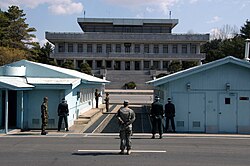People's Security
The Ministry of Social Security, responsible for internal security, social control, and basic police functions, is one of the most powerful organizations in North Korea and controls the People's Social Security Forces, composed of an estimated 144,000 public security personnel. [2] It maintains law and public order; investigates common criminal cases; manages the prison system and traffic control; monitors citizens' political attitudes; conducts background investigations, census, and civil registrations; controls individual travel; manages the government's classified documents; protects government and party officials; and patrols government buildings and some government and party construction activities. [2]
The ministry has deputy ministers for personnel, political affairs, legal counselling, security, surveillance, internal affairs, rear services, and engineering. [2] There are approximately twenty-seven bureaus, but the functional responsibilities of only some of the bureaus are known. [2] The Security Bureau is responsible for ordinary law enforcement and most police functions. The Investigation Bureau handles investigations of criminal and economic crimes. [2] The Protection Bureau is responsible for fire protection, traffic control, public health, and customs. [2] The Registration Bureau issues citizen identification cards and maintains public records on births, deaths, marriages, residence registration, and passports. [2]
Below the ministry level, there are public security bureaus for each province and directly administered city. [2] These bureaus are headed by either a senior colonel or a lieutenant colonel of police, depending on the size of the population. [2] Public security departments at each city or county and smaller substations through the country are staffed by about 100 personnel and are led by subaltern officers. [2] They are organized roughly parallel to the ministry itself and have several divisions responsible for carrying out various functions. [2]
North Korean uniformed civil police officers are primarily unarmed traffic officers. [1]
This page is based on this
Wikipedia article Text is available under the
CC BY-SA 4.0 license; additional terms may apply.
Images, videos and audio are available under their respective licenses.




